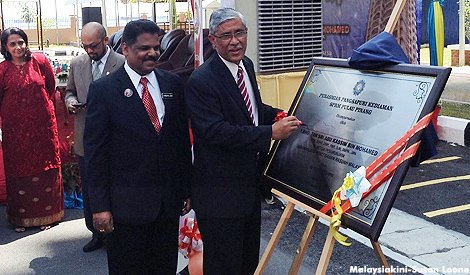September 5, 2013
We outclass many of our peers, says MACC Chief
by Susan Loone@http://www.malaysiakini.com
Unlike
some other nations that set up anti-graft agencies as mere "window
dressing to hide corrupt practices", the Malaysian watchdog has more
bite, said its chief Abu Kassim Mohammad.
Speaking
at an event in Penang yesterday, he pointed out that even the United
Nations acknowledged the Malaysian Anti-Corruption Commission’s (MACC)
structure.
"Based
on my experiences and observations overseas, anti-corruption agencies
in other countries cannot match us in terms of capacity, logistics,
position and power.
"The
UN recognises that we do not only have a high element of accountability
but very good facilities and support from the government as well," he
stressed.
Abu Kassim (right)
also claimed that currently 90 percent of the caseshandled by the
commission had been wrapped up within the "expected time frame".
He
explained that this was achieved by introducing team-based
investigations to promptly deal with backlog cases, which were now
"non-existent".
"This
is something we can be proud of because one of the rakyat's aspiration
is to see the MACC carry out speedy investigation of cases," he said.
However,
Abu Kassim said the public must understand that it was not always easy
to probe these cases as corruption was a "very complex crime".
Unlike
other cases, he noted, the victims involved in corruption were not
always prepared to cooperate with MACC or provide its officers with
information.
"The
victims often feel that this is a victimless crime because the two
sides are involved... so it is difficult for them to come forward and
help us," he said.
Meanwhile, Abu Kassim also revealed that more public service officials were coming out to lodge reports with MACC.
"Corruption
in this sector is increasing but while in the past 20-25 years, MACC
arrests have been targeted at public officers, today we focus not only
on the private sector but the public (individuals or groups) who give
bribes," he said.
"This change is related to public service officers who are willing to come out to report cases of corruption," he added.
"This is a good achievement compared to other countries, where 75 percent of the population reportedly pay bribes," he added.






No comments:
Post a Comment